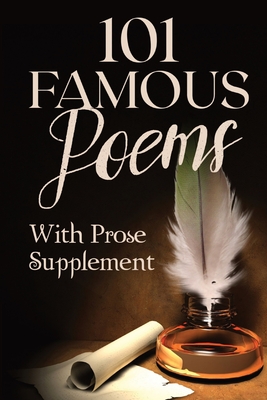101 Famous Poems

101 Famous Poems
Originally published in 1916, Roy J. Cook's "101 Famous Poems" is one of the finest collections of poetry ever assembled. The book seems to include a poem, word, or even a phrase (e.g. tinnabulation and runcible spoons) for just about everyone.
There are poems of encouragement (such as Frank Stanton's "Keep a'Goin") and poems to delight both children and the young at heart-such as Eugene Field's "Little Boy Blue," Edward Lear's "The Owl and the Pussy Cat," and Mary Howitt's "The Spider and the Fly." There are also light-hearted poems with good points for even today, such Eugene Field's "The Duel" (an entertaining tale about the gingham dog and calico cat that scrapped so wildly they ate each other up).
From the World War I era, we read Alan Seeger's "I Have a Rendezvous with Death," which tragically came true in his case. Other heart-wrenching war poems from that era include "In Flander's Fields" by John McRae, "Grass" by Carl Sandburg, "The Spires of Oxford" by Winifred M. Letts, and "How Did You Die?" by Edmund Vance Cooke. Poems about death include Tennyson's "Crossing the Bar," not to mention the chilling lyrics of "The Raven" and "The Bells" by Edgar Allan Poe.
Story lovers will enjoy the epic poem of how Horatius and his two comrades saved Rome by staving fearsome foes at the foot of a bridge, or the story of Bess, the innkeeper's daughter, so tragically told in Alfred Noyes' "Highwayman" classic.
There are American patriotic poems, such as Henry Van Dyke's "America for Me," "God Save the Flag" by Oliver Wendell Holmes, and "The Flag Goes By" penned by Henry Holcomb Bennett. And what American schoolchild hasn't heard the patriotic words of Sir Walter Scott-"breathes there the man with soul so dead, who never to himself hath said, this is my own, my native land?"
Readers of-and audiobook listeners to-this book will pick up many common phrases drawn from or adapted from the storied words and verses of yesteryear (e.g. "ours is not to wonder why, ours is but to do or die" adapted from Alfred Tennyson's "Charge of the Light Brigade")
"Let me live in a house by the side of the road and be a friend to men" is a direct quote from a poem by Sam Walter Foss. The "runcible spoon," which was made up by Edward Lear as part of his nonsense poetry, is now included in more than one English dictionary. "I Shall Not Pass this Way Again" comes directly from
Originally published in 1916, Roy J. Cook's "101 Famous Poems" is one of t
PRP: 117.98 Lei
Acesta este Prețul Recomandat de Producător. Prețul de vânzare al produsului este afișat mai jos.
106.18Lei
106.18Lei
117.98 LeiLivrare in 2-4 saptamani
Descrierea produsului
Originally published in 1916, Roy J. Cook's "101 Famous Poems" is one of the finest collections of poetry ever assembled. The book seems to include a poem, word, or even a phrase (e.g. tinnabulation and runcible spoons) for just about everyone.
There are poems of encouragement (such as Frank Stanton's "Keep a'Goin") and poems to delight both children and the young at heart-such as Eugene Field's "Little Boy Blue," Edward Lear's "The Owl and the Pussy Cat," and Mary Howitt's "The Spider and the Fly." There are also light-hearted poems with good points for even today, such Eugene Field's "The Duel" (an entertaining tale about the gingham dog and calico cat that scrapped so wildly they ate each other up).
From the World War I era, we read Alan Seeger's "I Have a Rendezvous with Death," which tragically came true in his case. Other heart-wrenching war poems from that era include "In Flander's Fields" by John McRae, "Grass" by Carl Sandburg, "The Spires of Oxford" by Winifred M. Letts, and "How Did You Die?" by Edmund Vance Cooke. Poems about death include Tennyson's "Crossing the Bar," not to mention the chilling lyrics of "The Raven" and "The Bells" by Edgar Allan Poe.
Story lovers will enjoy the epic poem of how Horatius and his two comrades saved Rome by staving fearsome foes at the foot of a bridge, or the story of Bess, the innkeeper's daughter, so tragically told in Alfred Noyes' "Highwayman" classic.
There are American patriotic poems, such as Henry Van Dyke's "America for Me," "God Save the Flag" by Oliver Wendell Holmes, and "The Flag Goes By" penned by Henry Holcomb Bennett. And what American schoolchild hasn't heard the patriotic words of Sir Walter Scott-"breathes there the man with soul so dead, who never to himself hath said, this is my own, my native land?"
Readers of-and audiobook listeners to-this book will pick up many common phrases drawn from or adapted from the storied words and verses of yesteryear (e.g. "ours is not to wonder why, ours is but to do or die" adapted from Alfred Tennyson's "Charge of the Light Brigade")
"Let me live in a house by the side of the road and be a friend to men" is a direct quote from a poem by Sam Walter Foss. The "runcible spoon," which was made up by Edward Lear as part of his nonsense poetry, is now included in more than one English dictionary. "I Shall Not Pass this Way Again" comes directly from
Originally published in 1916, Roy J. Cook's "101 Famous Poems" is one of t
Detaliile produsului










